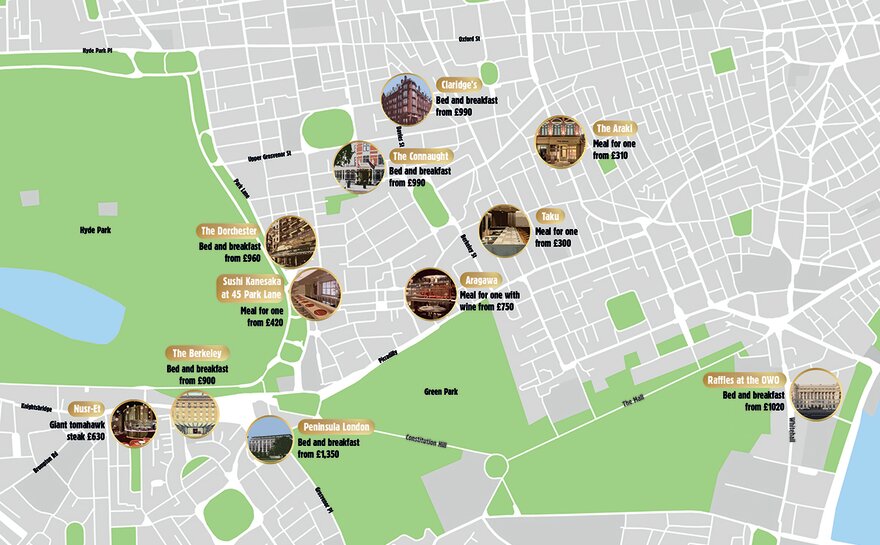As room rates reach unprecedented levels and new openings promise ultra-premium experiences, can the capital's luxury market continue its relentless rise?
To the casual spectator, London's ultra-premium hospitality offering has taken a heavy shot of steroids since the pandemic ended. Prices in the capital's prestigious W1 and SW1 postcodes have swollen to unprecedented levels, offering up £1,000 room rates, £750 steaks and £450 sushi menus. The cost of living crisis that has gripped the rest of the nation has failed to find its way past the banked fleets of Lamborghinis lining the streets of Mayfair. To put it bluntly: "It is absolutely batshit crazy as to where prices have gone," says Tom Cahalan, director of Dorsia Travel, a luxury travel agent for high-net-worth individuals.
But what factors are driving these prices upwards? And are they sustainable? Is this something the rest of the industry should sit up and watch closely? Or, like a Jeff Bezos space-shot, is it only of interest to an elite few?
Last year was a colossal year for the luxury market in London. In the autumn Peninsula London in Belgravia open its doors – the first five-star, new-build hotel since the Bulgari in 2012 – at a cost of £1b, followed by Raffles London at the Old War Office (OWO) in Westminster, at a cost of £1.5b. The double opening generated countless column inches concerning the rise of the £1,000 hotel room. At the time of writing, online room rates start at £1,350 for the Peninsula and £1,020 for bed and breakfast at Raffles at the OWO, for the same weekday dates in mid-March.
This year will also see the launch of the Mandarin Oriental Mayfair followed in 2025 by – among others – the Chancery Rosewood in Mayfair and the Waldorf Astoria Admiralty Arch. Across the five-star board, prices are rising. "I used to stay at the Connaught for £600 a night pre-Covid," says Cahalan. "But now it can cost me over £1,000 a night."
The data bears this out, says Thomas Emanuel, senior director at hotel market data firm STR (a subsidiary of CoStar): "Since Covid, average room rates have gone up 34% from October 2019 to October 2023 – that's significant rate growth." Pre-Covid, the average room rate for the luxury market was £331 compared to £444 for the fourth quarter of 2023.
Meanwhile, Mayfair has seen the launch of two of the most expensive menus in the capital's dining history. In July 2023, sushi master Shinji Kanesaka opened a 13-seat omakese counter at 45 Park Lane – the first outpost of his two-Michelin-starred Tokyo restaurant, Sushi Kanesaka – with an 18-course menu priced at £420 per person. Then, in October, the first overseas branch of Tokyo steak restaurant Aragawa opened its doors, where a meal with wine for one will cost you upwards of £750. Such bills make the likes of Mayfair sushi restaurant Taku (launched in October 2022; meal for one priced at £300 for the Signature omakase) look like a relative bargain.
"The remarkable thing to me is that these restaurants keep opening," says Jay Rayner, restaurant critic for The Observer. "There are millions of pounds being invested, and you start to think: good god, where are all these customers coming from?"
There's no doubt, however, that they are coming in their droves. More than ever, London is awash with millionaire and billionaire cash. According to a 2023 report by property consultancy Knight Frank, 15,900 ultra-high-net worth individuals (deemed to be those with a net worth over $30m) own properties in London, second only to New York. The same report named London as the most important city for the world's wealthy, and this wealthy elite is only getting wealthier – globally, the number of ultra-high-net-worth individuals is expected to grow by 5%-6% per annum.
"Follow the money and it's to do with non-dom tax status, simple as that," says Rayner. "It has attracted some significantly wealthy people. This is not me just being an old lefty, this is a simple structural issue to do with a system of taxation and being able to print money and not pay tax. It has encouraged a lot of money from the Middle East and Asia, and it's just taken a little bit of time for the commercial interests to catch up with that and decide that this money will remain. It's essentially limitless and they can service that."
Tourists are looking for a luxury experience in London
While the ranks of high-net-worth individuals are swelling, their numbers are also being bolstered by the arrival of cash-rich tourists looking for a luxury experience.
"When you compare London with Paris or Rome or any of the key European destinations, particularly within the luxury space, London is still number one," says Fflur Roberts, global head of luxury goods at business intelligence service Euromonitor. "It's very much an aspirational place to come. There is a huge amount of wealth in the world and it is getting younger. Plus on the back of Covid, people are living differently: they are prioritising experiences over buying more stuff."
Cahalan rose to prominence by staying in and writing online reviews of five-star hotels after selling his software company, and then used that knowledge to set up an exclusive travel agency for high-net-worth individuals. He says London is more popular than ever among his client base. "London has an amazing, extremely diverse restaurant scene. It is also very good when it comes to sporting events – Wimbledon sells out, there are a lot of great football teams – and then there's London Fashion Week and the art scene."
With no shortage of spending money in supply, just what are customers getting in exchange for these soaring prices? Firstly, it is worth noting that these rates are being driven, in part, by inflation. Across the world, hotel prices are rising. According to a forecast compiled by the American Express Global Business Travel Consulting team, hotel prices in major cities will go up by anything up to 18% in 2024, compounding rises across the industry since Covid.
Staffing models in luxury hotels mean they are more susceptible than most to the rise of labour costs, says hotel consultant Melvin Gold. "Hotels are undoubtedly suffering a lot more costs. The staffing ratios in luxury hotels are significant compared to the others in the market – whether that is having a butler on tap or servicing a room two or three times a day. But hoteliers at this level of the market are constantly looking to satisfy an increasingly aspirational clientele. And they're frankly doing whatever they need to do to justify the rates that people are paying."
For Cahalan, the arrival of the likes of the Peninsula London and Raffles at the OWO – coupled with the recent refurbishment of the likes of Claridge's (where room rates start at £990 for bed and breakfast in March midweek) and the Dorchester (room rate £960 for bed and breakfast for the same dates) – has simply served to keep London apace with other global cities.
"The ultra-luxury market has always existed in London, but it's now catching up with Paris. A good barometer of a city, at a very high level, is to look on hotel benefit programme American Express Fine Hotels and Resorts and see how many hotels are listed. London has a lot. But I think the difference between London and, say, Paris, is that in London only six or seven of them are actually really top hotels, whereas in Paris, you just can't go wrong."
What do customers get for their money?
In terms of what customers are getting for their increased spend, Cahalan points towards the recent additions to the Connaught and the Berkeley hotels. "The Berkeley has opened its own pâtisserie and so has the Connaught, Hélène Darroze at the Connaught has three Michelin stars and Jean-Georges Vongerichten has also opened a restaurant there. But it all comes down to personal taste. Some people might want that, others might prefer the bigger rooms of the Peninsula, where the smallest rooms are the size of junior suites at other hotels."
When it comes to the food, however, Rayner doesn't agree that higher prices always deliver a better product. "Long ago, I said that expensive restaurants are wasted on the people who can afford them, and I hold to that. There are very few high-net-worth individuals who actually care or have any knowledge of the food that they are paying to eat. Often in the case of a three-Michelin-starred restaurant, there will be people who have saved up for that experience, but a lot of these places aren't at that status. At Café Lapérouse, the cheapest bottle of wine is £70 and it serves a shoddy version of French bistro classics, of which much better iterations are available elsewhere in London. And yet it was full. My assumption is that the key clientele literally doesn't care."
For Rayner, these restaurants are sustainable only so long as London – particularly Mayfair and Belgravia – remain attractive for London's wealthy non-doms. "I really do think it is a specific phenomenon related to two or three postcodes and it's all born out of a particular tax environment that is friendly to high-net-worth individuals. And if I was one of those people, I'd be looking at the polls right now and asking myself whether, come the next election and years following that, Britain will be as friendly a place, given the shadow chancellor has made it clear that changes to the non-dom tax regulation is on the cards."
For hotels, however, Gold expects the luxury hotel market to be practically impregnable to any economic changes. "I don't think there is any way of proving there is enough very wealthy people to fill every single one of these rooms at 80% occupancy, because you never know how many hotels will open in the market at any one time. But there's some very smart people and there's an awful lot of work gone into this. And there's every expectation that overall these hotels enhance London as a destination."
What both Gold and Rayner are clear about is that these prices are a phenomenon unique to just a few postcodes. "Mayfair and Park Lane, stretching into the eastern part of Knightsbridge, are the sweet spots," says Gold. "You can do something that attracts column inches and is unique in its setting, but if it isn't in those postcodes, it won't attract the same room rates. We're talking about a very complex and discerning market and it shows very few signs of moving beyond that very tight area."
The same applies to restaurants. "Yes, you get fancy openings elsewhere," says Rayner. "The group behind Tattu have just opened their Greek place Fenix in Manchester. It looks sort of expensive and they spent £7m on it, but compared to what's going on with these places, it doesn't really compare."
Does he have any advice to restaurants looking to cash in on the wealthy elite? "Yes: stay away! If you're a smart restaurateur and you know what you're doing, there is still fun to be had in other central postcodes."
After a tumultuous five years that has seen a global pandemic, a war in Ukraine and a war in Israel, is there anything that can stop London's elite postcodes pulling further away from the rest of the country?
"There is so much wealth in the world and it's not going to go away overnight," says Roberts. "If a Louis Vuitton bag can sell for a million pounds – and there's a waiting list for it – then people are not going to want to stop spending in this luxury market."
Continue reading
You need to be a premium member to view this. Subscribe from just 99p per week.
Already subscribed? Log In











